West Bengal was once the cultural and intellectual capital of India. Today, we are witnessing a lawless, culturally destroyed, politically ruined state that has lost its conscience—hundreds of women from Sandeshkhali, and multiple flogging incidents that were caught on camera. Hundreds of other brutal rape and murder cases which the general public will never know or hear about. If only the Mamata Banerjee government would have taken notice.
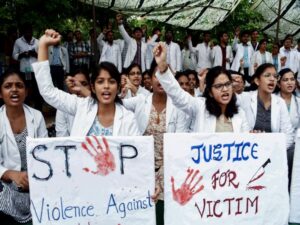
Women from Bengal have been constantly pointing fingers and taking names of people who are involved in these crimes. But what did the Mamata Banerjee Government do? They blamed MODI. Now what? What are hashtags like #JusticeForMoumita or #DissmissMamataGovernment going to do?
The politics around The Kolkata Rape and Murder was inevitable. BJP has jumped into action mode and is doing what the opposition should do in a vibrant Democracy like India. But according to a lot of internet users think that the BJP should be blamed equally. The goons from TMC and now the horrifying case of Moumita. Why should the whole country see a rape case like this every decade? Why can’t we for once tell our girls and women that you will be safe while studying or working? How much parenting does it take to teach your kid NOT to brutally rape and murder a woman?
The brutal rape and murder of a young woman in the city have once again brought the issue of women’s safety to the forefront. The incident, which took place in August 2024, not only shocked the residents of Kolkata but also reverberated across the country, sparking widespread protests and calls for stricter law enforcement.
The crime, which involved a local doctor, has highlighted the alarming levels of violence against women in India, a country where such incidents are all too frequent. This article delves into the horrific event, exploring the details of the crime, the investigation that followed, the public and political reactions, and the broader implications for Kolkata and beyond.
Gruesome Details of the Kolkata Doctor Case
The victim, a young woman in her late twenties, was reportedly on her way home when she was attacked in a secluded area of the city. According to initial reports, she was abducted by her assailant, a man with a history of criminal behavior, and subjected to brutal violence before being murdered. The crime scene, located near a less populated area of Kolkata, bore witness to the unimaginable horror the victim endured.
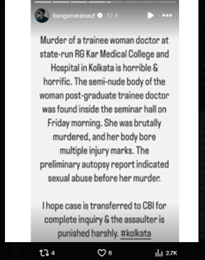
Medical examinations confirmed the worst fears—she had been raped before being killed. The post-mortem report revealed severe injuries, indicating that the victim had fought valiantly to resist her attacker. The autopsy findings were deeply disturbing, highlighting the extreme level of violence involved in the crime.
The Kolkata Rape and Murder quickly garnered media attention, with news channels and websites providing round-the-clock coverage. The victim’s identity was protected following Indian laws, which prohibit the disclosure of the identity of rape victims. However, this did not prevent the public outcry that ensued. In the days following the incident, citizens of Kolkata and people across India took to the streets, demanding justice for the young woman and stringent action against the perpetrator.
Police Investigation and Arrests After the Kolkata Doctor Rape and Murder
In the wake of the crime, the Kolkata Police launched a comprehensive investigation to identify and apprehend the perpetrator. With mounting pressure from both the public and higher authorities, the police force left no stone unturned in their efforts to solve the case swiftly.
The investigation led to the arrest of a local doctor, who was known to the victim. The doctor, whose name has been withheld pending trial, had a history of suspicious behavior, although he had no prior convictions. His arrest sent shockwaves through the community, particularly because of his profession, which is generally associated with trust and care.
Forensic evidence played a crucial role in linking the suspect to the crime. DNA samples collected from the crime scene matched those of the suspect, providing concrete evidence of his involvement. Additionally, eyewitness accounts and CCTV footage from the area corroborated the findings, further solidifying the case against him.
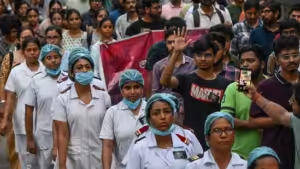
The police, in a press conference, confirmed the arrest and assured the public that the investigation was progressing rapidly. They also emphasized the importance of allowing the legal process to take its course, urging the public to refrain from taking the law into their own hands. Despite these assurances, the anger and frustration among the people of Kolkata remained palpable, with many demanding swift justice.
Public and Political Reactions After the Kolkata Rape and Murder Case
The Kolkata Rape and Murder sparked a wave of protests across Kolkata and other parts of West Bengal. Citizens, activists, and students came together in large numbers to express their outrage and demand justice. Candlelight vigils were held in various parts of the city, with participants calling for stricter laws and more effective implementation to prevent such heinous crimes.
The outrage was not confined to the streets; social media platforms were flooded with posts expressing anger, sorrow, and solidarity with the victim’s family. Hashtags like #JusticeForKolkataRapeVictim and #StopViolenceAgainstWomen trended for days, reflecting the widespread discontent and demand for action.
Political leaders, too, were quick to respond to the incident. West Bengal Chief Minister Mamata Banerjee, known for her strong stance on women’s rights, issued a statement condemning the crime and assuring the public that justice would be served. She also called for a thorough investigation and promised that the state government would take all necessary steps to ensure the safety of women in Kolkata.
However, the opposition parties were critical of the state government’s response. Leaders from the Bharatiya Janata Party (BJP) and the Communist Party of India (Marxist) accused the Mamata Banerjee administration of failing to maintain law and order in the state. They pointed to previous incidents of violence against women in West Bengal, arguing that the government had not done enough to protect its citizens.
NGOs and human rights organizations also weighed in on the issue, calling for systemic changes to address the root causes of violence against women. They emphasized the need for better education, gender sensitization, and more robust legal frameworks to protect women from such atrocities.
The political discourse around the incident highlighted the deep divisions in Indian society when it comes to issues of gender and safety. While some called for immediate retribution against the perpetrator, others urged a more measured approach, focusing on long-term solutions to prevent such crimes in the future.
Impact on Kolkata and Broader Implications of the Kolkata Rape and Murder Case
A “ROAR” of anger is being heard on the streets of Kolkata by Women. It took a doctor’s life and her body to convince the women of Bangladesh, oh Sorry, West Bengal to wake up to the fact that their city is diseased. The brutal rape and murder have had a profound impact on Kolkata, a city that prides itself on its rich cultural heritage and relatively low crime rates compared to other metropolitan areas in India. The incident has shaken the city’s sense of safety and security, particularly for women, and has sparked widespread fear and anxiety.
Residents of Kolkata, especially women, have expressed concerns about their safety while moving around the city, particularly at night. The Kolkata Rape and Murder has prompted many to question whether enough is being done to protect women and ensure that such horrific crimes do not recur. Public trust in the local law enforcement agencies has been significantly eroded, with many questioning the effectiveness of the police in preventing such incidents and apprehending the perpetrators quickly.
Beyond Kolkata, this incident has reignited a broader national conversation about the safety of women in India. Despite numerous laws and regulations aimed at protecting women, incidents of rape and sexual violence continue to occur at alarming rates across the country. The Kolkata case has highlighted the persistent challenges that India faces in ensuring the safety and security of its women.
The incident has also drawn attention to the need for systemic changes, not just in law enforcement but in societal attitudes towards women. The broader implications of this crime extend beyond the immediate tragedy—it has become a symbol of the ongoing struggle to create a society where women can live without fear of violence and discrimination.
Media Coverage and Public Discourse
Media reporters on the ground have done a mind-boggling job. they have been the true strength of the women who are protesting for their right to LIVE. The media played a crucial role in bringing the Kolkata rape and murder incident to national and international attention. Indian news channels and websites provided extensive coverage of the crime, often leading to sensational headlines that captured the horror of the incident. However, this coverage also sparked a debate about the ethics of how such sensitive cases are reported.
While some media outlets were praised for their thorough and responsible reporting, others were criticized for sensationalizing the crime and focusing more on the graphic details rather than the broader issues at hand. This has raised important questions about the role of the media in shaping public discourse on issues of sexual violence.
Social media also played a significant role in the public response to the Kolkata Rape and Murder. Platforms like Twitter, Facebook, and Instagram were flooded with posts expressing outrage, grief, and calls for justice. The widespread use of hashtags and the sharing of information and opinions helped to keep the issue in the public eye, ensuring that it did not fade from the headlines.
However, the intense media scrutiny also led to concerns about the privacy and dignity of the victim and her family. While the Indian legal system prohibits the disclosure of a rape victim’s identity, the constant media attention and public discourse inevitably drew unwanted attention to those involved. This has sparked a conversation about the need for more sensitive and respectful coverage of such incidents in the media.
Bollywood’s Leftist Celebrities and Their Tweets Criticizing the Mamata Government
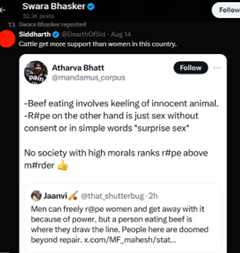
https://x.com/biharigurl/status/1817804639707795841

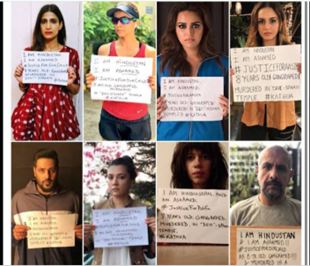
Complete Silence from Bollywood. You will not see any Deepika, Swara, Gul Panag, Anurag Kashyap, Vishal Dadlani, Kalki, Farhan Akhtar, or Zoya Akhtar. Nobody will go and support the protests in Bengal but they all have a lot of time to spare for the anti-CAA protests in Delhi. The two-faced nature of Bollywood keeps getting exposed time and again and their box office is proof that people are sick of them now.
Adding to the controversy, several Bollywood celebrities, known for their leftist leanings, have come under fire for their response to the incident. Figures like Swara Bhaskar, Ratna Pathak Shah, and Arfa Khanum Sherwani have been vocal about societal issues in the past, often using their platforms to speak out on matters of justice and equality. However, in this case, their response has been perceived as inadequate and even dismissive.
Critics argue that these celebrities have downplayed the role of the state government in the crime, choosing instead to focus on broader societal issues like patriarchy and misogyny. While these are undoubtedly important factors, the refusal to hold the Mamata Banerjee government accountable has led to accusations that these celebrities are more concerned with protecting their political affiliations than with seeking justice for the victim. Their attempts to frame the incident as a reflection of societal ills, rather than a failure of governance, have been seen by many as an attempt to deflect criticism from the state administration.
This has sparked a wider debate about the role of celebrities in shaping public discourse and their responsibility to hold those in power accountable, regardless of political alignment. The selective outrage displayed by some of these figures has raised questions about the sincerity of their activism, with many accusing them of being hypocritical and partisan in their approach.
Government Response and Policy Changes After the Kolkata Rape and Murder
When any crime is committed against women in any other state of India, Mamata “DIDI” is the first one to speak against it. But why isn’t she helping women in her own state? The worst JOKE is that she is leading a protest to get the accused hanged. Who is she protesting against, that is the million-dollar question. Mamata Banerjee is Protesting Against Mamata Banerjee to Ask Mamata Banerjee to Resign.
Chief Minister Mamata Banerjee, announced a series of measures aimed at improving the safety and security of women in Kolkata and across the state. These measures included the establishment of more women-only police stations, the installation of additional CCTV cameras in vulnerable areas, and the implementation of stricter monitoring of repeat offenders.
Mamata Banerjee also called for a review of the existing laws related to sexual violence and pushed for faster trials in cases of rape and murder. She emphasized the need for a more efficient legal system that can deliver justice swiftly and effectively, thereby deterring potential criminals.
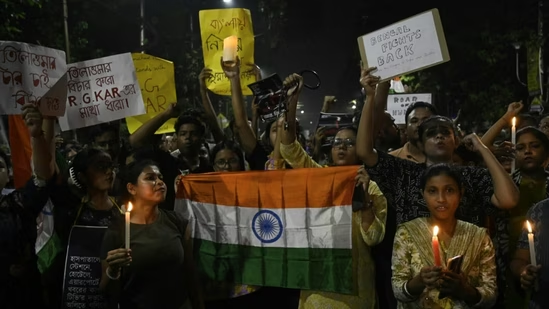
At the national level, there were renewed calls for more comprehensive reforms to address the issue of sexual violence against women. Activists and women’s rights organizations advocated for better education on gender equality, stronger enforcement of existing laws, and the introduction of new policies to protect women in both public and private spaces.
Despite these efforts, there is a growing sense that more needs to be done to address the root causes of violence against women. Many have called for a cultural shift in how women are perceived and treated in Indian society, arguing that laws alone are not enough to prevent such crimes. There is a pressing need for a collective effort to challenge and change the deeply ingrained patriarchal attitudes that contribute to the prevalence of sexual violence.
Our Opinion
West Bengal has been a diseased state since the partition. We forget the horrors of partition on the Bengal side because of many reasons. The state which was already a very densely populated state during the British times, was again forced to ingest several millions of people. The state which was constantly facing famines and floods, the state which had already seen a lot of bloodshed was asked to accommodate these people.
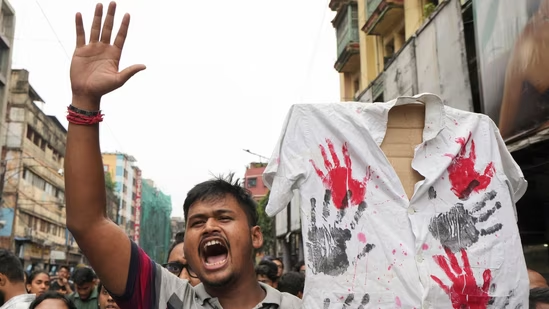
Punjab had a lot of land which was given away to families that came from Pakistan. But Bengal was a different story altogether. The government failed Bengal then, they are failing Bengal now. When was the last time you heard about a new, upcoming famous actor, singer, author, thinker, philosopher, playwriter, instrument player, or anyone related to the creative field? Bengal has been living in the old glory of Rabindranath Tagore and Subhash Chandra Bose.
This is NOT the Bengal that produces talent. The general public of India was cautioned earlier as well. People are being invited, on the other side, to stay alert. But no, we only listen when one of our daughters has to die a gruesome death. The girl was preparing herself to save lives in the future.
Enough is enough. People especially women of Bengal have to stay on the roads until this Government steps down there are hundreds of protestors and opposition party workers that the Kolkata Police has arrested. They could save a doctor but they could save the image of the Mamata government. Kudos!
Bengal needs a dose. They need a president’s rule and we consider it the Modi government’s failure if they haven’t done that even after hundreds of their own party supporters and workers being killed by the goons of Mamata Banerjee. Didi is not looking good in this situation from any angle. The people of the state have to rise against true injustice.
#MamataMustResign should be a trending hashtag for months on end if you want to restore law and order in the state of West Bengal. The combined effect of the government’s perceived failures and the attempts by certain celebrities to shift the narrative has had a detrimental impact on public trust. Many feel betrayed by those they once looked up to as voices of reason and justice, leading to a growing disillusionment with both political leadership and influential public figures. The incident has laid bare the deep divisions within Indian society, where issues of justice and governance are often overshadowed by political allegiances and ideological battles.
As the legal process unfolds, the people of Kolkata and India at large continue to watch closely, hoping that justice will be served. But beyond the immediate case, there is a broader hope that this tragedy will catalyze real change—a change that ensures that no woman has to live in fear and that the sanctity of life and dignity is upheld for all.
The Kolkata Rape and Murder again shows us that the path forward requires a collective effort from all sections of society—governments, law enforcement, the judiciary, the media, and civil society—to create a safer and more equitable environment for women. Only through such a comprehensive approach can the cycle of violence be broken, and the dream of a truly safe society be realized.
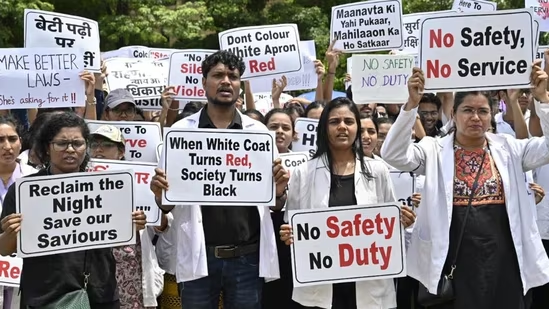
Leave a Reply